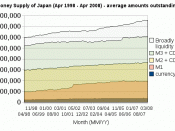Pressure on china to revalue its currency was mounting. EU and even Japan to pressurized China to revalue its currency had joined U.S. Recall that china received plaudits during the Asian crisis for maintaining stable exchange rate policy and avoiding competitive devaluation. Then, why Chinese currency was now blamed for global imbalances?
World's dependence on US for growth has been increasing and it played disproportionately larger share in world growth throughout 90's. Japan has long its status as growth engine and EU's economic growth has been sluggish. But the equation has somewhat changed lately. For the first time, all three major drivers [US, EU & Japan] of world economic growth are suffering. In this situation, china and to some extent India have emerged as bright spots, showing high growth rates. If one were to go by "official" growth figures of china, over last two decades, it represents the most stunning growth story in human history.
UNDERSTANDING CHINA'S ENIGMATIC GROWTH
Various factors that have contributed to Chinese growth:
1) Conducive investment environment - fixed exchange rate system, preferential taxtreatment
2) Cheaplabor
3) World-class infrastructure, etc.
All these factors, over period of time have made China-the world's factory. Major MNC are shifting their production base to china, enabling them to drastically reduce their cost of production. Central banks today are worried more about deflation than inflation.
Exports and heavy investment by government in infrastructure have been major drivers of china's economic growth. According to observation made by Stephen Roach of Morgan Stanley, 65% of china's growth could be traceable to export during last 3 years. While investment share of GDP rose to 42% in 2002, which is not good for the long run sustenance. Domestic demand has to play larger role.
BEIJING'S DILEMMA
WHAT IF CHINA WERE TO REVALUE THE YUAN?
Export has been one of the major drivers of china's growth, appreciation of Renminbi might hurt it. Manufacturing goods form major part of Chinese export. To what extent exports will be hurt through Yuan revaluation is open to question, since no country in world come close to china in terms of providing cheaper cost structure. One really wonders if appreciating Yuan, let say by 15-20% would affect china's cost structure because labor cost in china is 5-10% of US's labor cost and much below other developing countries.
Out of a population of 1.3 billion, at least 30 million are thought to be unemployed in the cities. A further 150 million or so former rural residents are thought to be roaming from job to job in urban areas. At least another 200 million people remain on the land but have virtually no work to do. Export sector has been providing employment on a huge scale. Beijing would not like to hurt this sector through Renminbi appreciation.
Any revaluation of Yuan, at a time when domestic financial system is weak could be suicidal.
IMPLICATIONS ON US
China was the 2nd largest contributor in financing US trade deficit in 2002. The peg in effect forces to import US monetary policy, which is hyper stimulative. China's intervention also supports the federal reserve's efforts to keep interest rates low. Central banks in the Asia alone account for more than 40% of all international purchases of US government debt. If they stopped pegging their currencies to the dollar, the regions dollar would no longer rise and flow into US assets. Lack of intervention by Asian central banks could see US interest rates moving up. This could hurt dawdling recovery that the world's largest economy is making.
Nearly 2/3 of china's manufacturing exporters are MNC and they collectively account for more than ý of china's total exports. Foreign firms would suffer on Yuan revaluation.
IF CHINA DOESN'T REVALUE
If China doesn't revalue the Renminbi, net capital inflows and large accumulation of forex reserves will continue. Andy Xie of Morgan Stanley and one of the sharpest china-analyst has taken the view that rapid increase in forex reserves appears to be due to expectation shift rather than change in fundamentals. Chinese are pouring money into acquiring properties at home. The 'perception' that the Renminbi is significantly undervalued and can only appreciate in the long run is leading to a significant return flight of capital of both residents and non-residents. Increase in money supply due to increased forex reserves is exacerbating the already excessive expansion in bank lending, money supply growth and investment.
1) Investment as share of GDP rose to 42% in 2002
2) Money growth and credit growth were 20% & 25% respectively.
Although the process of "sterilizing" the effects of reserve increases on the base money supply has so far been less onerous in china because of low interest rates paid on domestic central bank bonds, experience shows that sterilization becomes more costly and less effective the larger it is and the longer it goes on.
IS CHINA TO BLAME?
World today is witnessing similar situation, as it did in 70's and 80's. then, it was Japan who took the world by storm and threatened US's status as world economic superpower. Japan was blamed for manipulating its currency by pegging yen at 360/$. On September 22, 1985 the US, UK, France, Germany and Japan sat down, to reengineer the world's main exchange rates. The 'PLAZA ACCORD' effectively forced currencies of Japan and Germany to rise against dollar. This time around, we have China whose sheer rise in world trade has stunned the world. Though, it is no where close replacing US as world economic superpower, the speed of its rise is surely raising many eyebrows. After massive devaluation of around 50%, china fixed its currency-Renminbi at 8.28/$ with extremely narrow band of 8.276-8.28. since then Chinese currency has been fixed at 8.28/$
US followed 'strong dollar' policy and dollar appreciated against all major currencies in 90's but no one then asked china to depreciate Yuan.
The main argument that goes for Yuan revaluation is that Chinese are keeping Yuan artificially low and hurting American manufacturing sector in form of job loses. But there are serious flaws in the argument:
1) China's doesn't compete on cheaper Yuan, its advantages lie in cheap labor, world-class infrastructure, conducive investment environment, etc.
2) Theory of comparative advantage is at play. China has a relative advantage in manufacturing sector and thus should be exporting manufactured goods to US. Similarly, India enjoys comparative advantage in service sector.
All Asian central banks actively manage their currencies through market intervention. This year, Japan has bought more than yen 13.5 trillion [ $123 billion] to check yen's gain. Then, why is china alone to be blamed? Clearly, China being the only bright spot in this dull global economy, become easy target to blame.
THE ROAD AHEAD
Certainly any country facing current account deficit of 5-6% of GDP would have invited currency crises. But , well US is different case. It can finance its CA deficit by printing its own currency. Put it this way ---
If US is running deficit, some other country would be running surplus. Let say, India is running surplus with US. This inflow of extra dollars into India might drive rupee up. So RBI in order to check rupee gain would purchase dollars from the market and park them in US T-Bills earning 1.25% on them. Thus, effectively US is able to finance its CA deficit, simply by printing more dollars.
But things have changed since 9/11, interest rates are at historic lows, corporate scandals, stock market fall, etc. have shattered investors' confidence. Investors are looking at other investment avenues. This has made increasingly difficult for US to finance its CA deficit. Experts believe that all major developing countries have increased proportion of Euro in their reserve holdings. Thus, what we have seen so far is gradual correction of dollar. But analyst says that dollar will have to fall by around 30% to bring CA deficit to sustainable level. Neither Euro nor Yen are in position to bear such large appreciation. Thus, appropriate dollar depreciation will be frustrated, if the Asian economies do not do their part on currency appreciation. China has weight of nearly 10% in dollar trade weighted index. Chinese Yuan, thus will have to play major role in dollar correction in future even though it appreciated to make it to 8.11 from 8.28,



Outstanding Essay ....Very Good
The writer has used the facts and figures to support his/her vies, really very good article with good & relevant logic.
0 out of 0 people found this comment useful.